40.1.3.4.5 (40 > 5)
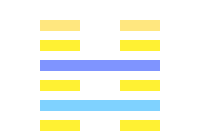
40.1.3.4.5 (40 > 5) - THE KIEH HEXAGRAM.
- 1. The first line, divided, shows that its subject will commit no error.
- 3. The third line, divided, shows a porter with his burden, (yet) riding in a carriage. He will (only) tempt robbers to attack him. However firm and correct he may (try to) be, there will be cause for regret.
- 4. (To the subject of) the fourth line, undivided, (it is said), ‘Remove your toes. Friends will (then) come, between you and whom there will be mutual confidence.’
- 5. The fifth line, divided, shows (its subject), the superior man ( = the ruler), executing his function of removing (whatever is injurious to the idea of the hexagram), in which case there will be good fortune, and confidence in him will be shown even by the small men.
40.1.3.4.5 (40 > 5) - Assuming one's responsibilities
One will be able to do what is necessary to avoid regretting having acquired rights.
Bing DeepL Google Yandex40.1.3.4.5 (40 > 5) - Assuming one's responsibilities
One will be able to do what is necessary to avoid regretting having acquired rights.
Bing DeepL Google Yandex40.1.3.4.5 (40 > 5) - Kieh, la libération
Kieh : 1. Délivrer, faire échapper, échapper au danger ; 2. Disperser ; 3. Ouvrir, séparer, s’ouvrir. Se dit du mouvement de la germination. 4. Résoudre une difficulté, une complication.
-
1. Délivrer quelqu’un est chose excellente.
Quand le fort et le faible s’entendent selon la justice, il n’y a pas de faute à craindre. -
3. Si un porteur se met dans un char et qu’il survienne des voleurs, il sera attaqué et échappera difficilement ; s’il abandonne sa charge, il pourra se sauver.
Pour un porteur, aller en char est honteux ; c’est attirer sur soi les voleurs.
Il n’appartient pas à des gens du commun d’aller en char . -
4. Échappez d’abord et après cela les amis viendront témoigner leur fidélité (sinon ils vous abandonnent).
Note. Le mot qui signifie ordinairement gros orteil est expliqué par les commentateurs comme ayant ici le sens de tchū, commencement, d’abord - 5. C’est au sage d’écarter (les maux) et de résoudre (les difficultés) ; s’il y réussit, il gagnera la confiance du vulgaire.
40.1.3.4.5 (40 > 5) - Assumer ses responsabilités
On saura faire le nécessaire pour ne pas avoir à regretter d'avoir acquis des droits.
Bing DeepL Google Yandex40.1.3.4.5 (40 > 5) - Módosítás
- 1. Fel akarja szabadítani magát, ez egy jó döntés.
- 3. Ha valaki elhanyagolja, másoknak adja.
- 4. Ajtók fognak megnyílni ha valaki felhagy a felesleges kényelemkereséssel.
- 5. Csak egy alkalmas személy tudja megmutatni a megoldást.
Les trigrammes
Les trigrammes sont des combinaisons de trois traits yin et yang. Dans l'hexagramme, les trois traits du dessous constituent le trigramme inférieur et représentent la situation intérieure. Les trois lignes du haut constituent le trigramme supérieur et représentent la situation extérieure.
Trigramme supérieur : Le tonnerre L'eau


Trigramme inférieur : L'eau Le ciel


La formation: 40
What is already there
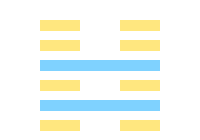
40 - THE KIEH HEXAGRAM.
In (the state indicated by) Kieh advantage will be found in the south-west. If no (further) operations be called for, there will be good fortune in coming back(to the old conditions). If some operations be called for, there will be good fortune in the early conducting of them.
Bing DeepL Google Yandex40 - Kieh, la libération
Kieh : 1. Délivrer, faire échapper, échapper au danger ; 2. Disperser ; 3. Ouvrir, séparer, s’ouvrir. Se dit du mouvement de la germination. 4. Résoudre une difficulté, une complication.
Texte et commentaire
Si l’on réussit à faire échapper aux dangers, on gagnera les gens à soi et l’on aura des relations heureuses ; on gardera le milieu. En tout ce que l’on fait, l’activité est chose utile et fait acquérir des mérites. Kieh est : se trouvant en danger, savoir agir et échapper. Quand le ciel et la terre ouvrent les pores (3e sens) des êtres, le tonnerre et la pluie se produisent. Alors les plantes et les arbres à fruit bourgeonnent. Bien important est le temps où tout s’ouvre.
Symbolisme
Le tonnerre et la pluie forment le Koua Kieh. Le sage est indulgent pour l’erreur et traite les coupables avec douceur.
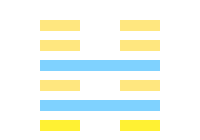
40.1 (40 > 54) - THE KIEH HEXAGRAM.
The first line, divided, shows that its subject will commit no error.
Bing DeepL Google Yandex40.1 (40 > 54) - Wanting to lose one's constraints
One wants to free oneself, it is a good decision.
Bing DeepL Google Yandex40.1 (40 > 54) - Wanting to lose one's constraints
One wants to free oneself, it is a good decision.
Bing DeepL Google Yandex40.1 (40 > 54) - Kieh, la libération
Kieh : 1. Délivrer, faire échapper, échapper au danger ; 2. Disperser ; 3. Ouvrir, séparer, s’ouvrir. Se dit du mouvement de la germination. 4. Résoudre une difficulté, une complication.
Délivrer quelqu’un est chose excellente.
Quand le fort et le faible s’entendent selon la justice, il n’y a pas de faute à craindre.
40.1 (40 > 54) - Vouloir perdre ses contraintes
On veut se libérer, c'est une bonne décision.
Bing DeepL Google Yandex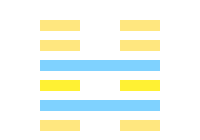
40.3 (40 > 32) - THE KIEH HEXAGRAM.
The third line, divided, shows a porter with his burden, (yet) riding in a carriage. He will (only) tempt robbers to attack him. However firm and correct he may (try to) be, there will be cause for regret.
Bing DeepL Google Yandex40.3 (40 > 32) - Forgiving slight mistakes
When one neglects, one gives to others.
Bing DeepL Google Yandex40.3 (40 > 32) - Forgiving slight mistakes
When one neglects, one gives to others.
Bing DeepL Google Yandex40.3 (40 > 32) - Kieh, la libération
Kieh : 1. Délivrer, faire échapper, échapper au danger ; 2. Disperser ; 3. Ouvrir, séparer, s’ouvrir. Se dit du mouvement de la germination. 4. Résoudre une difficulté, une complication.
Si un porteur se met dans un char et qu’il survienne des voleurs, il sera attaqué et échappera difficilement ; s’il abandonne sa charge, il pourra se sauver.
Pour un porteur, aller en char est honteux ; c’est attirer sur soi les voleurs.
Il n’appartient pas à des gens du commun d’aller en char .
40.3 (40 > 32) - Pardonner les fautes légères
Quand on néglige on donne aux autres.
Bing DeepL Google Yandex
40.4 (40 > 7) - THE KIEH HEXAGRAM.
(To the subject of) the fourth line, undivided, (it is said), ‘Remove your toes. Friends will (then) come, between you and whom there will be mutual confidence.’
Bing DeepL Google Yandex40.4 (40 > 7) - Getting rid of a friend who has become embarrassing
Doors will open if one deviates from an unnecessary convenience.
Bing DeepL Google Yandex40.4 (40 > 7) - Getting rid of a friend who has become embarrassing
Doors will open if one deviates from an unnecessary convenience.
Bing DeepL Google Yandex40.4 (40 > 7) - Kieh, la libération
Kieh : 1. Délivrer, faire échapper, échapper au danger ; 2. Disperser ; 3. Ouvrir, séparer, s’ouvrir. Se dit du mouvement de la germination. 4. Résoudre une difficulté, une complication.
Échappez d’abord et après cela les amis viendront témoigner leur fidélité (sinon ils vous abandonnent).
Note. Le mot qui signifie ordinairement gros orteil est expliqué par les commentateurs comme ayant ici le sens de tchū, commencement, d’abord
40.4 (40 > 7) - Se débarrasser d'un ami devenu gênant
Des portes s'ouvriront si l'on s'écarte d'une commodité superflue.
Bing DeepL Google Yandex40.4 (40 > 7) - Módosítás
Ajtók fognak megnyílni ha valaki felhagy a felesleges kényelemkereséssel.
Bing DeepL Google Yandex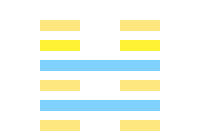
40.5 (40 > 47) - THE KIEH HEXAGRAM.
The fifth line, divided, shows (its subject), the superior man ( = the ruler), executing his function of removing (whatever is injurious to the idea of the hexagram), in which case there will be good fortune, and confidence in him will be shown even by the small men.
Bing DeepL Google Yandex40.5 (40 > 47) - Achieving one's goals
Only a capable person can show the solution.
Bing DeepL Google Yandex40.5 (40 > 47) - Achieving one's goals
Only a capable person can show the solution.
Bing DeepL Google Yandex40.5 (40 > 47) - Kieh, la libération
Kieh : 1. Délivrer, faire échapper, échapper au danger ; 2. Disperser ; 3. Ouvrir, séparer, s’ouvrir. Se dit du mouvement de la germination. 4. Résoudre une difficulté, une complication.
C’est au sage d’écarter (les maux) et de résoudre (les difficultés) ; s’il y réussit, il gagnera la confiance du vulgaire.
Bing DeepL Google Yandex40.5 (40 > 47) - Arriver à ses fins
Seule une personne compétente peut montrer la solution.
Bing DeepL Google Yandex40.5 (40 > 47) - Módosítás
Csak egy alkalmas személy tudja megmutatni a megoldást.
Bing DeepL Google YandexEn préparation : 5
Ce qui est en passe d'arriver

5 - THE HSÜ HEXAGRAM.
Hsü intimates that, with the sincerity which is declared in it, there will be brilliant success. With firmness there will be good fortune ; and it will be advantageous to cross the great stream.
Bing DeepL Google Yandex5 - Hope
Something is coming, look forward to it with confidence rather than going and see.
Bing DeepL Google Yandex5 - Hope
Something is coming, look forward to it with confidence rather than going and see.
Bing DeepL Google Yandex5 - Su, l’attente
Su : Arrêt forcé, empêchement, obstacle, danger. Résistance aux forces nuisibles.
Texte
L’homme droit et ferme aura un succès brillant, s’affermira, se complétera heureusement ; il saura traverser les difficultés. (Litt. : Le grand fleuve — les grandes eaux ; moyen de briser les obstacles, etc.)
Symbolisme
Su est : droiture en face du péril, fermeté inébranlable ne se laissant ni abattre ni surprendre, et dont la justice ne s’affaiblit, ne s’épuise jamais. Celui qui occupe par sa dignité la place du ciel doit maintenir la justice, la fidélité au devoir ; il pourra alors triompher des difficultés, quelque chose qu’il entreprenne.
Su est formé du trigramme « nuage » au-dessus du trigramme « ciel ». Ce sont les nuages s’élevant dans le ciel ; ainsi le sage goûte joie et plaisir.
5 - Espoir
Quelque chose vient, attendre en confiance au lieu d'aller voir.
Bing DeepL Google YandexL'hexagramme nucléaire : 63.2.3.4.5.6 (63 > 38)
L'hexagramme nucléaire est l'association des deux trigrammes intérieurs (traits 2,3,4 et 3,4,5). Il représente la racine, ou l'origine de la situation.
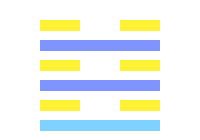
63.2.3.4.5.6 (63 > 38) - THE KÎ 3Î HEXAGRAM.
- 2. The second line, divided, (shows its subject as) a wife who has lost her (carriage-)screen. There is no occasion to go in pursuit of it. In seven days she will find it.
- 3. The third line, undivided, (suggests the case of) Kao 3ung who attacked the Demon region, but was three years in subduing it. Small men should not be employed (in such enterprises).
- 4. The fourth line, divided, shows its subject with rags provided against any leak (in his boat), and on his guard all day long.
- 5. The fifth line, undivided, shows its subject (as) the neighbour in the east who slaughters an ox (for his sacrifice) ; but this is not equal to the (small) spring sacrifice of the neighbour in the west, whose sincerity receives the blessing.
- 6. The topmost line, divided, shows its subject with (even) his head immersed. The position is perilous.
63.2.3.4.5.6 (63 > 38) - Making sure that the secret is well kept
One checks that the most powerful are not yet aware of it.
Bing DeepL Google Yandex63.2.3.4.5.6 (63 > 38) - Making sure that the secret is well kept
One checks that the most powerful are not yet aware of it.
Bing DeepL Google Yandex63.2.3.4.5.6 (63 > 38) - Tchi tzi, ce qui suit l’achèvement
Tchi-tzi : traversée achevée, achèvement, succès, moyen d’achever, compléter.
-
2. Voyage fini (interrompu), comme d’une femme qui, ayant perdu le voile de son char (Keū tchi pi, tenture qui entourait le char et cachait la personne qui le montait. Sans ce voile, une femme vertueuse ne pouvait voyager. Son voyage était donc fini jusqu’à ce qu’elle le retrouve et elle ne pouvait aller à découvert pour le chercher) ne peut le chercher, mais le retrouve seulement après quelques (sept) jours.
Elle agit ainsi parce qu’elle suit la voie de la sagesse. -
3. Expédition achevée. — Kao-tsong (empereur de la dynastie Shang ; régnait vers 1300 et resta cinquante-neuf ans sur le trône. Les démons dont il s’agit sont les aborigènes insoumis et déprédateurs) attaqua la région des démons et, en trois ans, acheva son triomphe. Un prince vulgaire n’eût pu le faire.
Il eut beaucoup de peine. -
4. Lorsque les bords, les franges d’un habit se mouillent, il faut être sur ses gardes jusqu’au bout de la traversée (ou bien : lorsqu’en bateau on est obligé d’employer les bords de ses habits pour boucher les trous, etc.).
Il y a lieu de craindre alors. -
5. Tel voisin de gauche (Est) sacrifie un bœuf, mais il n’atteint pas le mérite de son voisin de droite (Ouest), qui fait un sacrifice très inférieur. — C’est la droiture d’intention (et non l’oeuvre matérielle) qui fait obtenir le bonheur, condition de la réussite, d’un achèvement heureux.
Ainsi arrive grand bonheur. -
6. Celui qui, en traversant (un fleuve), se mouille la tête, est en danger. (Si la tête même entre dans l’eau.)
Cette situation est dangereuse, on ne peut en prévoir l’issue.
63.2.3.4.5.6 (63 > 38) - S'assurer que le secret est bien gardé
On vérifie que les plus puissants ne sont pas encore au courant.
Bing DeepL Google Yandex63.2.3.4.5.6 (63 > 38) - Maximum
- 2. Nem kér bizalmat de megkapja a javítások révén.
- 3. Keményen dolgozik hogy megoldjon egy problémát, ez gyötrelmes lesz. A legrátermettebbnek kell kezdenie.
- 4. Ha valaki nem várt nehézségbe ütközik, siessen ellenőrizni.
- 5. Az egyszerű sokkal sikeresebb lesz mint a bonyolult.
- 6. A többiek óvakodnak a segítségnyújtástól, így nélkülük javít tovább.
Guide
La situation de départ

40.5 (40 > 47) - THE KIEH HEXAGRAM.
The fifth line, divided, shows (its subject), the superior man ( = the ruler), executing his function of removing (whatever is injurious to the idea of the hexagram), in which case there will be good fortune, and confidence in him will be shown even by the small men.
Bing DeepL Google Yandex40.5 (40 > 47) - Achieving one's goals
Only a capable person can show the solution.
Bing DeepL Google Yandex40.5 (40 > 47) - Achieving one's goals
Only a capable person can show the solution.
Bing DeepL Google Yandex40.5 (40 > 47) - Kieh, la libération
Kieh : 1. Délivrer, faire échapper, échapper au danger ; 2. Disperser ; 3. Ouvrir, séparer, s’ouvrir. Se dit du mouvement de la germination. 4. Résoudre une difficulté, une complication.
C’est au sage d’écarter (les maux) et de résoudre (les difficultés) ; s’il y réussit, il gagnera la confiance du vulgaire.
Bing DeepL Google Yandex40.5 (40 > 47) - Arriver à ses fins
Seule une personne compétente peut montrer la solution.
Bing DeepL Google Yandex40.5 (40 > 47) - Módosítás
Csak egy alkalmas személy tudja megmutatni a megoldást.
Bing DeepL Google YandexCorrection
La direction suivant laquelle le guide va plier

40.1.3.4 (40 > 11) - THE KIEH HEXAGRAM.
- 1. The first line, divided, shows that its subject will commit no error.
- 3. The third line, divided, shows a porter with his burden, (yet) riding in a carriage. He will (only) tempt robbers to attack him. However firm and correct he may (try to) be, there will be cause for regret.
- 4. (To the subject of) the fourth line, undivided, (it is said), ‘Remove your toes. Friends will (then) come, between you and whom there will be mutual confidence.’
40.1.3.4 (40 > 11) - Enjoying difficult tasks
One does one's duty while not being reluctant at all.
Bing DeepL Google Yandex40.1.3.4 (40 > 11) - Enjoying difficult tasks
One does one's duty while not being reluctant at all.
Bing DeepL Google Yandex40.1.3.4 (40 > 11) - Kieh, la libération
Kieh : 1. Délivrer, faire échapper, échapper au danger ; 2. Disperser ; 3. Ouvrir, séparer, s’ouvrir. Se dit du mouvement de la germination. 4. Résoudre une difficulté, une complication.
-
1. Délivrer quelqu’un est chose excellente.
Quand le fort et le faible s’entendent selon la justice, il n’y a pas de faute à craindre. -
3. Si un porteur se met dans un char et qu’il survienne des voleurs, il sera attaqué et échappera difficilement ; s’il abandonne sa charge, il pourra se sauver.
Pour un porteur, aller en char est honteux ; c’est attirer sur soi les voleurs.
Il n’appartient pas à des gens du commun d’aller en char . -
4. Échappez d’abord et après cela les amis viendront témoigner leur fidélité (sinon ils vous abandonnent).
Note. Le mot qui signifie ordinairement gros orteil est expliqué par les commentateurs comme ayant ici le sens de tchū, commencement, d’abord
40.1.3.4 (40 > 11) - Apprécier les tâches difficiles
On accomplit sa besogne en ne rechignant pas le moins du monde.
Bing DeepL Google Yandex40.1.3.4 (40 > 11) - Módosítás
- 1. Fel akarja szabadítani magát, ez egy jó döntés.
- 3. Ha valaki elhanyagolja, másoknak adja.
- 4. Ajtók fognak megnyílni ha valaki felhagy a felesleges kényelemkereséssel.
Forum
Avez-vous besoin d'aide pour comprendre ce tirage ?
Rejoignez le forum et demandez de l'aide.
BBCode
Le BBCode ci-dessous est à votre disposition pour être copié-collé dans votre fil de discussion.
Link
Lien vers ce tirage

